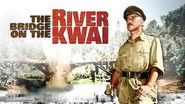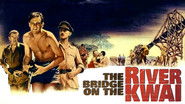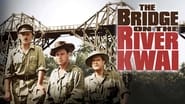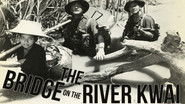BellaDancerSF
Brilliant filmmaking. Suspenseful, articulate direction. Genius performances, starting with Alec Guinness, and all the way through. Even a great song and theme. Brilliant.
cinemajesty
Movie Review: "The Bridge On The River Kwai" (1957)This splendid novel-adaptation going-out from author Pierre Boulle (1912-1994), royally-received to be directed by exceptional film-maker David Lean (1908-1991), threading every single shot to the scene to sequence to the finished movie, putting a fictious as dramatized "World-War-II" South-East Asian conflict brought onto an Burma-Siam-Railway enterprise thread to fail by issuing the title-given bridge into an adventure story of British soldiers, led by enduring the utmost single-cell, a breeding hot-box-torture of the imaginable with regard to motion-history-making character of Colonel Nicholson, portrayed by Alec Guinness (1914-2000) to the famous scene of marching to prison under the "Colonel Bogey March" accompanied by a run-down, bootstrapped platoon of leather-shoe broken, nevertheless morally-stabil soldiers of the Royal British Army into a painstaking-design detailing prisoner-of-war (POW) encampment ruled by an ordeal-wishing, hard-to-get-by as constant-overlooking Japanese Colonel Saito, portrayed by Academy-Award-nominated, but then failing to present legendary producer Sam Spiegel (1901-1985) with a "clean sweep" of 8 Academy-Award nominations to 8 wibns at the Oscars in its 30th edition on March 26th 1958 due to arguably overacted scenes of defeat by actor Sessue Hayakawa (1889-1973), when lucky-punch ease-spreading Hollywood actor William Holden (1918-1981) hardened in movie-future-perfect-action-cinema promising trainings by suspense-debriefs delivering actor Jack Hawkins (1910-1973) as Major Warden, earns all favors of an awestruck smash-hit-supporting international audiences in holiday season of 1957/1958, paving a the way for a new kind of "deus ex machine" enduring secret agent ingnited in the year 1962 by Albert R. Broccoli (1909-1996) and Harry Saltzman (1915-1994) by the code name of "007".© 2018 Felix Alexander Dausend
(Cinemajesty Entertainments LLC)
JohnHowardReid
Copyright 1958 by Horizon Productions. Released worldwide through Columbia Pictures Corp. New York opening: 18 December 1957. U.S. release: November 1957. U.K. release: 9 February 1958. Australian release: 8 March 1958. Sydney opening at the Lyceum. 14,506 feet. 161 minutes. (Available on a superb Columbia DVD).SYNOPSIS: Captured British officer eventually agrees to co-operate with the Japanese in building a railway bridge across the River Kwai.NOTES: Extraordinarily, Pierre Boulle himself, author of the 1955 novel, although he had absolutely nothing at all to do with the writing of the screenplay, was handed the annual Academy Award for Best Screenplay Based on Material from Another Medium.The only other category for which the film was Oscar-nominated was Supporting Actor, in which Sessue Hayakawa was defeated by Red Buttons in "Sayonara". On the other hand, this movie was the Winner of the British Film Academy Awards for Best Film, Best Screenplay (incorrectly awarded to novelist Pierre Boulle instead of Carl Foreman and Michael Wilson), Best Actor, Sir Alec Guinness. Winner of the New York Film Critics Awards for Best Motion Picture, Best Direction, Best Male Performance (Sir Alec Guinness). Most Outstanding Directorial Achievement of 1957 — Directors Guild of America.Best Film of 1958 — Film Daily poll of American film critics. Best Film of 1957, Best Director, Best Actor (Guinness), Best Supporting Actor (Hayakawa) — National Board of Review.Number one attraction at the U.S. and Canadian box office for 1958 with an initial domestic rental gross exceeding $15 million. Number one box office hit in the U.K., Australia, New Zealand, Ceylon, Burma and South Africa for 1958. Top of the foreign film rentals in India and second to Sayonara among foreign film releases in Japan.Negative cost: only $2.9 million. Locations filmed in Burma. A major contribution to the music score's success is due to Malcolm Arnold's use of K.J. Alford's "Colonel Bogey March".COMMENT: Although I'd agree with a minority of critics that William Holden, fine actor though he is, doesn't quite belong in this movie, it still ranks as an outstanding achievement in all departments. I'm inclined to agree for once with the Press Book superlatives, headlined here as BRITAIN'S GREATEST MOTION PICTURE TRIUMPH! Maybe a little less than "greatest" as there are a number of films including The Red Shoes, Great Expectations, The Winslow Boy, The Third Man, Henry V and Owd Bob which have equal if not superior claims. But a great British triumph certainly. Thanks mainly to Guinness, Hayakawa, Hildyard, Arnold, and Lean.ANOTHER REVIEW: The movie holds up reasonably well. The conflict between three national types represented by Guinness, Hayakawa and Holden is not only well observed and sharply presented, but still holds true these twenty years later. Holden is not outdone or out- acted or even over-classed. In fact he holds up his end remarkably well. Hawkins does not have a principal role, but heads the A-1 support cast... Not only a marvelous technical triumph, but powerful, perhaps even too forceful entertainment (to use that word in its broadest sense). Only the somewhat ambiguously too-ironical conclusion fails to fully satisfy and drive the message really solidly home. — J.H.R. in Sydney Shout (December 1977).
Anssi Vartiainen
Director David Lean's earlier war movie, this one taking place in the jungles of Burma. A group of British soldiers have been captured by the Japanese, but their commanding officer, Lieutenant Colonel Nicholson (Alec Guinness), instantly clashes with the camp commander, Colonel Saito (Sessue Hayakawa), who he sees trying to undermine the rules of war by forcing the officers into manual labour alongside their men. Whereas Saito sees Nicholson as a traitor to the rules of war for having surrendered alive. Also, soon after the British have arrived, an American soldier named Shears (William Holden) manages to escape.Lean takes us on a long journey in this film. The duality of war's conventions and rules being put against the sheer savagery of it is examined through the characters of Nicholson and Saito - and to a lesser degree Shears and the company he keeps. War is horrendous and oftentimes meaningless, but quite often men try to deal with this by forcing artificial rules onto it. Rules, which become so precious to them, that they cannot adapt them or operate outside of them. And in a way this is just as horrendous and meaningless.This film lives by its grand scope and the talent of its actors. And luckily both of those work very well. Guinness is hands down the most memorable performance and the one that embodies the themes of the movie the best, but the rest of the cast is also very good. The film is also shot beautifully, with some great scenes and sets included.The Bridge on the River Kwai doesn't quite live up to the grandeur of Lawrence of Arabia, but it is still a fine piece of war cinema and well worth a watch for all interested.









